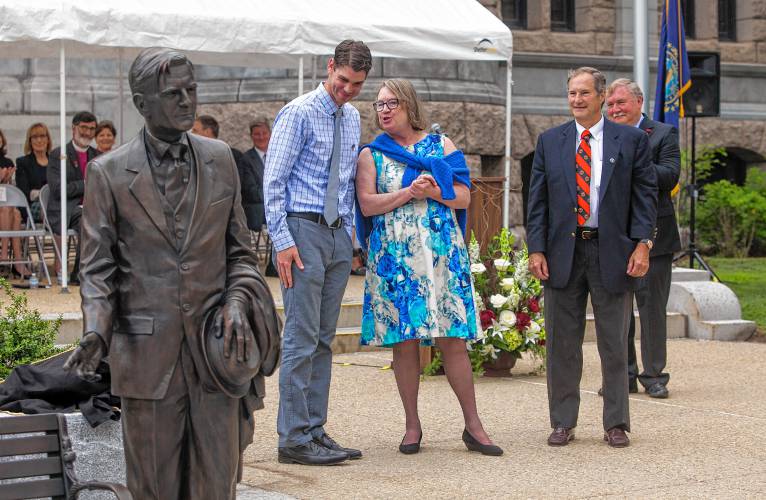
Sculptor J. Brett Grill (left) talks with Joan OMeara Winant as Dr. John Winant, Jr. and Representative Stephen Shurtleff look on after the unveiling of the John Gilbert Winant bronze statue in front of the State Library on Park Street on Friday, June 30, 2017. Photo: GEOFF FORESTER—Monitor staff
Political heroes are rare. The last genuine political hero, Senator Philip S. Hart, is remembered on the front of an office building in Washington, D.C. as:
“A man of incorruptible integrity and personal courage strengthened by inner grace and outer gentleness…. His humility and ethics earned him his place as the conscience of the Senate.”
Last Friday (June 30), another remembrance took place in New Hampshire for a man of equivalent political stature but modest demeanor. A life-size statue of John Gilbert Winant was dedicated in the state’s capitol of Concord.
Winant, a Republican, not only served as the state’s governor and U.S. Ambassador to England, but was instrumental in urging President Franklin Roosevelt to get America off the back-bench and into the war against Germany. Ultimately, it took Pearl Harbor to motivate the president.
After the war, Winant came home to Concord. In 1947, Suffering from depression, he took his life at the age of 58.
“His marriage had dissolved and his wife was estranged,” Ray Duckler for The Concord Monitor writes (June 30). “His relationship with Prime Minister Winston Churchill’s daughter had ended. He had fallen into debt. And the death of President Franklin Delano Roosevelt had left his political career in doubt after he had risen to Ambassador to Great Britain.
“ ‘He had to have suffered greatly,’ said his grandson, Dr. John Winant Jr., a pediatrician who lives in New Jersey. ‘There were so many things that were acting against him. There was no future in politics, no support there, and I’m sure that was as low as he could be, and as a consequence, even today the stigma of depression and suicide goes on.’ ”
Nonetheless, the list of accomplishments by this political hero is distinguished.
“[Winant] was a three-time New Hampshire governor who gave money to people on the street during The Depression… he fostered our alliance with Great Britain during World War II, and …walked the streets of London to offer comfort and kind words to the British while German war planes obliterated the city,… he created a bipartisan climate in Washington D.C., that politicians could learn from today, …he founded the social security system,… he founded the League of New Hampshire Craftsmen, and … purchased the land that served as the home for the Old Man of The Mountain,” New Hampshire’s great stone face in the White Mountains.
I was drawn to Winant after reading Lynn Olson’s superb book, Citizens of London, that describes how the former New Hampshire governor was enlisted by the Democrat Roosevelt to represent the United States and strengthen its coalition with England prior to U.S. entry into the war. However, he was far from a typical politician.
“Winant was a lifelong Republican,” Harvard magazine wrote in 2000, “whose humanitarian principles transcended party lines. Influenced by the writings of Charles Dickens and John Ruskin and inspired by the examples of Lincoln and Theodore Roosevelt, he was as governor a forceful advocate of progressive reform initiatives, including a 48-hour work week for women and children, a minimum wage, and the abolition of capital punishment. In 1935, Franklin D. Roosevelt appointed him the first chairman of the Social Security Board.”
But it was his direct appeal to the people that endeared this American to the British people. On June 6, 1942, Winant’s speech rallied striking miners with meaning that extended beyond the immediate crisis of war.
“You who suffered so deeply in the long Depression years,” Winant told the miners, “know we must move on a great social offensive if we are to win the war completely. It is not a short-term military job. We must solemnly resolve that in our future order we will not tolerate the economic evils which breed poverty and war. This is not something that we shelve for the duration. It is part of the war.
“We must always remember,” Winant concluded, “that it is the things of the spirit that in the end prevail. That caring counts. That where there is no vision, people perish. That hope and faith count, and that without charity there can be nothing good. That by daring to live dangerously, we are learning to live generously. And that by believing in the inherent goodness of man, we may meet the call of your great Prime Minister and ‘stride forward into the unknown with growing confidence.’ ”
“The statue,” The Monitor adds, “shows Winant at his best. He’s not on a pedestal, instead standing on ground level, like everyone else. His dignified features showing his approachable nature wear well with his signature three-piece suit. He’s here, downtown, forever, telling his story, the one about courage, character, kindness and, yes, an illness that needs to move from under a dark cloth.
“ ‘You served our country with such honor and distinction,’ Rep. Steve Shurtleff, the master of ceremonies, told the crowd. ‘John Winant, welcome home.’ ”
Comments










